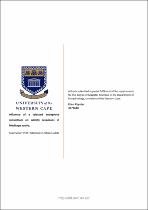| dc.contributor.advisor | Ludidi, Ndomelele Ndiko | |
| dc.contributor.author | Keyster, Eden | |
| dc.date.accessioned | 2022-04-21T08:36:47Z | |
| dc.date.available | 2022-04-21T22:10:08Z | |
| dc.date.issued | 2022 | |
| dc.identifier.uri | http://hdl.handle.net/11394/9061 | |
| dc.description | >Magister Scientiae - MSc | en_US |
| dc.description.abstract | Salinity is one of the major limiting factors to crop production, which consequently contributes to the risk of reduced food security. Among other factors, food security depends on availability of sufficient and nutritious food for humans. Livestock such as cattle and sheep are fed with various plant-based feeds; with Medicago sativa (commonly known as alfalfa or lucerne) being a very important forage/feed crop, so much that it is regarded as the queen of forage crops. However, alfalfa is severely affected by high soil salinity and thus its growth and yield are drastically reduced in soils with high NaCl content. Among the various alfalfa genotypes/varieties examined in this study, Agsalfa was identified as salt tolerant because it performed better under salt treatment compared to Magna601. | en_US |
| dc.language.iso | en | en_US |
| dc.publisher | University of Western Cape | en_US |
| dc.subject | Salinity stress | en_US |
| dc.subject | Bacterial endophytes | en_US |
| dc.subject | Oxidative stress | en_US |
| dc.subject | Plant development | en_US |
| dc.subject | Ascorbate peroxidase | en_US |
| dc.title | Influence of a selected endophyte consortium on salinity responses in Medicago sativa | en_US |
| dc.rights.holder | University of Western Cape | en_US |

